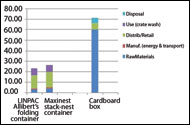 LINPAC Allibert’s Returnable Transit Packaging (RTP) has proved to be more carbon efficient than single-trip cardboard containers after just 20 trips. This was confirmed by the first study of its kind conducted in accordance with the new Product carbon footprint Standard launched by the Carbon Trust in November.
LINPAC Allibert’s Returnable Transit Packaging (RTP) has proved to be more carbon efficient than single-trip cardboard containers after just 20 trips. This was confirmed by the first study of its kind conducted in accordance with the new Product carbon footprint Standard launched by the Carbon Trust in November.
The carbon footprint analysis was carried out by Sustain Limited, under the new standard PAS (Publicly Available Specification) 2050: 2008 Assessment of the Life Cycle Greenhouse Gas Emissions of Goods and Services, which has been introduced and endorsed in the UK by the Carbon Trust and its partners. Up till now there has been no uniform standard for measuring carbon footprint which has led to confusion and doubt about claims, PAS 2050 sets a level playing field.
LINPAC Allibert’s popular Maxinest tray with bale arms, a standard RTP crate for transporting fruit, vegetables and other consumable food products and LINPAC Allibert’s new folding tray for the supermarket sector, which folds down to the smallest height of any products on the market, have both been proven by Sustain to deliver considerable carbon savings compared to standard cardboard boxes.
Danilo Oliynik, UK Commercial Directorat LINPAC Allibert, said: “Because plastic crates are continually re-used throughout their life, we’ve always believed that their environmental impact would be much less than one-trip packaging. This has now been confirmed by Sustain’s thorough study, which categorically proves our plastic RTP crates are more carbon efficient than cardboard.”
The findings apply to two ranges of LINPAC Allibert plastic crates manufactured in polypropylene at its plants in France, Germany, Spain and the UK. The data is based on a functional unit of one litre volume of goods transported per trip. Raw materials, transport and energy use in the manufacturing process, distribution from LINPAC Allibert’s sites and eventual disposal and recycling are also taken into account.
The performance of the folding and Maxinest trays is compared to a standard cardboard box FEFCO (code 0411), 600 x 400 x 180 mm, weighing 0.654 kg, used for a single trip and then collected and disposed of or recycled after each trip and again includes transport and manufacturing, raw materials and energy use.
The findings demonstrated that carbon parity is achieved at only 20 trips, after which RTP has an increasing advantage over cardboard.
The carbon footprint of LINPAC Allibert’s RTP is 67.8 per cent less than cardboard. Over five years, plastic crates typically make a total of 92 return trips. Based on this criterion, the folding container has a carbon footprint of 23.014 CO2 kg per unit over its working life and the Maxinest tray has a carbon footprint of 26.304 C02 kg. For the same usage, cardboard has a carbon footprint of 71.442 CO2 kg per unit.
LINPAC Allibert
Simon Mendes
Tel: 0121 506 0171
www.linpacallibert.com




Comments are closed.